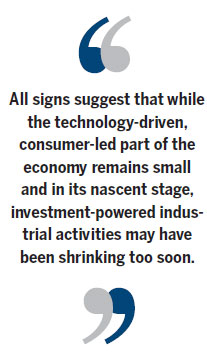Trimming economy's sails amid transition
Updated: 2015-11-20 08:08
By Ed Zhang(China Daily Europe)
|
|||||||||||
Changing China's growth model is a long process that requires fortitude and adjustments as it proceeds
People are gaining more and more knowledge about China's economic transition since Li Keqiang became premier almost three years ago. With lessons drawn from their experience, China-based businesspeople, despite the lingering slowdown, know better what the changes would be like than ever before.
First, the transition, if it is not to be aborted halfway, is going to be a long process. Releasing a few policy papers, changing a few laws and regulations, and merging a few bureaucracies all belong to the easier part of it. Allowing the right people to lead the correct, and genuine, changes and establishing the right practices takes a much longer time, even if it were not much more difficult.
What China wants is a comprehensive change, as officials often say. But they can't say they're going to make it happen in a sweeping way. There isn't a magic button to push. The transition can only come about bit by bit.

Second, not even many Chinese company owners and managers have anticipated a change of such magnitude. Local officials may have been even less prepared for a harsh anti-graft campaign in addition to the change in development strategy. For them, the ongoing transition is not only long, but also a painful learning process that many would find it difficult to adjust to.
Judging from the public speeches given by some of the nation's first-generation entrepreneurs, one can see they're making a serious effort to learn and adapt. But are they, or is any such group, equipped with enough knowledge and ideas to lead the nation through the transition? It's still hard to tell.
Third, the change can't be to simply upgrade all industry to a high level, featuring high technology and more highly value-added operations. That's only part of it. At the same time, it also requires a parallel process to make low-tech operations more efficient, through more innovative management.
In the past three years, China has not seen very rapid change in replacing old business models. There are encouraging changes, admittedly, such as those in e-commerce. But it will take time for a new business model to take shape and to provide opportunities for a hefty part of the population.
All signs suggest that while the technology-driven, consumer-led part of the economy remains small and in its nascent stage, investment-powered industrial activities may have been shrinking too soon. Complaints are particularly strong from the not-so-high-tech manufacturing businesses, squeezed by rising wages and flagging demand in overseas markets.

However, it must be pointed out that a consumer-led economy, no matter how well it is equipped with high technology, still cannot afford to do away with low-tech businesses.
Sustaining a reasonable level of demand for their products and services can help manufacturing industries maintain steady growth, and thereby make manufacturing companies and their workers less desperate and the process perhaps less painful in their adaptation to the economy's "new normal".
There is one low-tech business that may serve this role. It is the development of urban housing. As the abolition of the one-family-one-child policy may help the nation produce a few million more babies, the more liberal administration of rural-urban migration may, in combination, help more families move into the cities, especially the so-called megacities, to seek better living standards and better education for their children.
With the coming of a second child, the families that already have one child may also want to move into a larger house.
It is not unlikely, therefore, that residential real estate development will play an important role in helping Beijing maintain, at least in the short run, the economy's overall growth momentum in the next few years.
It may also help local governments in a selected number of cities, those with better services and those with better environmental quality, to shed some of their debt burden.
With the recent cut in interest rates, a slow recovery in the real estate industry in the larger cities, and a return of business for the larger developers, may be something to expect in China next year - although the central government would also have to keep a close eye on the market and step in once again if it becomes speculative and highly inflationary.
The author is editor-at-large of China Daily. Contact the writer at edzhang@chinadaily.com.cn
(China Daily European Weekly 11/20/2015 page13)
Today's Top News
Suspected mastermind of Paris attacks died
Xi condemns murder of man taken hostage by IS
'Schweppes bomb' used to bring down Russian plane
Paris suburb raid targets suspected attack mastermind
France, Russia launch more strikes against IS
England fans sing French national anthem
France requests European support in Mid East
Hollande pressed to amend foreign policy
Hot Topics
Lunar probe , China growth forecasts, Emission rules get tougher, China seen through 'colored lens', International board,
Editor's Picks

|

|

|

|

|

|






